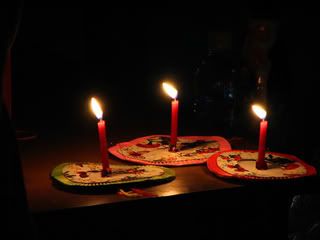Tuesday, September 2, 2008

中秋简介
中秋节是我国的传统佳节,与春节、端午节、冬至并称为中国汉族的四大传统节日。据史籍记载,古代帝王有春天祭日、秋天祭月的礼制,“中秋”一词最早出现在《周礼》一书;直至唐朝初年,中秋节才成为固定的节日,《唐书·太宗记》记载有“八月十五中秋节”;中秋节的盛行则始于宋朝。节期为农历八月十五,是日恰逢三秋之半,故名“中秋节”,也叫“仲秋节”;又因这个节日在秋季、八月,故又称“秋节”、“八月节”“八月会”;又有祈求团圆的信仰和相关节俗活动,故亦称“团圆节”、“女儿节”。因中秋节的主要活动都是围绕“月”进行的,所以又俗称“月节”“月夕”“追月节”“玩月节”“拜月节”;在唐朝,中秋节还被称为“端正月”。关于中秋节的起源,大致有三种:起源于古代对月的崇拜、月下歌舞觅偶的习俗、是古代秋报拜土地神的遗俗。
Brief profile of Mid-Autumn Festival
Mid-Autumn Festival is our country's traditional festival, with the Spring Festival, Dragon Boat Festival, the winter solstice and is called the Chinese Han Nationality's four big traditional festivals. According to historical records, ancient times the king had spring, the gala, the autumn to offer a sacrifice to the month the rituals of state, the words “Mid-Autumn Festival” appears the earliest in the book of "Zhou rite".
Until the Tang Dynasty's first year, Mid-Autumn Festival has only then become a fixed holiday. The ancestor records of "Tangshu•Too" has “August 15, Mid-Autumn Festival” in it.
Mid-Autumn Festival was in vogue, before it then began in the Song Dynasty. The festival time for lunar calendar in August 15, is the date halfth on third autumn, therefore “Mid-Autumn Festival”, and is also called “the second month of Autumn festival”.
It is because of this holiday in autumn, in August, therefore it is called “the Mid-Autumn Festival”, or "the meeting in August". Also has the hope to reunite one's belief and the joint custom activity, therefore also called “the Mid-Autumn Festival”, or “the daughter festival”.
Because Mid-Autumn Festival's major activity revolves “the month” to carry on, therefore is named “the month festival”, “the end of the month”, “to pursue the month festival”, “to enjoy the moon the festival”, or “to pay respects to the moon the festival”. There are many ways in which we can call it.
In the Tang Dynasty, Mid-Autumn Festival is also called “the endof the first lunar month”. About Mid-Autumn Festival's origin, it has three kinds approximately: Stems from under which we worship, and the month where in ancient times people returned to their parents' home to seek the custom of dance occasionally, to worship the ancient land of the God that left these customs to us.
Posted at 4:06 PM
